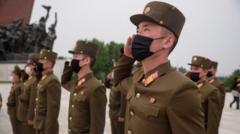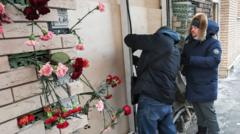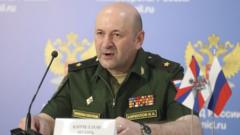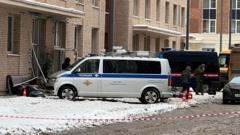This incident may shift perceptions among Russians regarding the war in Ukraine, raising questions about potential government responses and future escalations.
**General's Assassination Underscores Tensions in Moscow Amid Ongoing Ukraine Conflict**

**General's Assassination Underscores Tensions in Moscow Amid Ongoing Ukraine Conflict**
The targeted killing of a Russian general serves as a stark reminder of the ongoing war's proximity to civilians in Moscow.
As tensions surrounding the Ukraine conflict escalate, the assassination of Lt Gen Igor Kirillov, head of Russia's Nuclear, Biological, Chemical Defence Forces, on Tuesday morning marks a significant event. The incident occurred as Kirillov and his assistant, Ilya Polikarpov, fell victim to a bomb hidden on an electric scooter, starkly illustrating the harsh realities of life in a country at war.
Despite the evident turmoil caused by nearly three years of conflict, life in Moscow can often appear deceptively normal. Crowded Metro stations and bustling bars create an environment where many residents feel disconnected from the war, viewing it primarily through the lens of media reports. However, the assassination of a high-ranking military official in the heart of the city has shattered this illusion, bringing the brutal realities of the situation alarmingly close to home for many.
Local resident Liza described the change in atmosphere following the attack: “Until now, [the war] felt as if it was happening a long way off - now someone is dead, here, you can feel the consequences.” Her sentiments reflect a collective anxiety rippling through the city, as the echoes of war resonate in even the most mundane aspects of daily life.
While public reactions among Russian officials have predictably leaned toward blaming Ukraine for the attack, significant commentary from President Vladimir Putin remains absent. Observers note that statements from state media and former officials call for ruthless retaliation against Ukraine, suggesting a hardening of the Kremlin's stance rather than any inclination towards de-escalation.
As Russia grapples with the shock of this incident, analysts speculate about the implications for state policy moving forward. While the assassination could serve as a wake-up call for some citizens, leading to a reassessment of the war's distance, it is uncertain whether such sentiments will resonate within the upper echelons of power in Moscow. The probability of intensified military action looms large, as authorities respond to perceived threats with warnings of consequences for Ukraine.
In anticipation of his annual press conference, President Putin's response to this incident, alongside other pressing national topics, remains a key focal point for both Russian citizens and international observers. With the conflict in Ukraine approaching its third year, the underlying questions of governance, security, and the war's trajectory continue to loom over the discussions taking place in Moscow.
Despite the evident turmoil caused by nearly three years of conflict, life in Moscow can often appear deceptively normal. Crowded Metro stations and bustling bars create an environment where many residents feel disconnected from the war, viewing it primarily through the lens of media reports. However, the assassination of a high-ranking military official in the heart of the city has shattered this illusion, bringing the brutal realities of the situation alarmingly close to home for many.
Local resident Liza described the change in atmosphere following the attack: “Until now, [the war] felt as if it was happening a long way off - now someone is dead, here, you can feel the consequences.” Her sentiments reflect a collective anxiety rippling through the city, as the echoes of war resonate in even the most mundane aspects of daily life.
While public reactions among Russian officials have predictably leaned toward blaming Ukraine for the attack, significant commentary from President Vladimir Putin remains absent. Observers note that statements from state media and former officials call for ruthless retaliation against Ukraine, suggesting a hardening of the Kremlin's stance rather than any inclination towards de-escalation.
As Russia grapples with the shock of this incident, analysts speculate about the implications for state policy moving forward. While the assassination could serve as a wake-up call for some citizens, leading to a reassessment of the war's distance, it is uncertain whether such sentiments will resonate within the upper echelons of power in Moscow. The probability of intensified military action looms large, as authorities respond to perceived threats with warnings of consequences for Ukraine.
In anticipation of his annual press conference, President Putin's response to this incident, alongside other pressing national topics, remains a key focal point for both Russian citizens and international observers. With the conflict in Ukraine approaching its third year, the underlying questions of governance, security, and the war's trajectory continue to loom over the discussions taking place in Moscow.




















